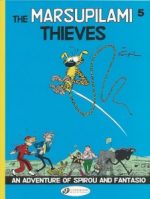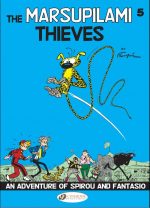

 y André Franquin, translated by Jerome Saincantin (Cinebook)
y André Franquin, translated by Jerome Saincantin (Cinebook)
ISBN: 978-1-84918-167-9 (Album PB)
Spirou (whose name translates as both “squirrel†and “mischievous†in the Walloon language) was created by French cartoonist François Robert Velter – AKA Rob-Vel – for Belgian publisher Éditions Dupuisin response to the phenomenal success of Hergé’s Tintin for rival outfit Casterman.
The legendary anthology Le Journal de Spirou was launched on April 21st 1938 with this other red-headed lad as lead of the anthology weekly comic which bears his name to this day.
He began life as a plucky bellboy/lift operator employed by the Moustique Hotel (a reference to publisher’s premier periodical Le Moustique) whose improbable adventures with his pet squirrel Spip, eventually evolved into high-flying surreal comedy dramas.
Spirou and his pals have spearheaded the magazine for most of its life, with a phalanx of truly impressive creators carrying on Velter’s work, beginning with his wife Blanche “Davine†Dumoulin who took over the strip when her husband enlisted in 1939. She was aided by Belgian artist Luc Lafnet until 1943 when Dupuis purchased all rights to the feature, after which comic-strip prodigy Joseph Gillain (“Jijéâ€) took over.
In 1946 Jijé‘s assistant André Franquin assumed the reins, slowly sidelining the short, gag-like vignettes in favour of longer epic adventure serials, introducing a wide and engaging cast of regulars and ultimately creating a phenomenally popular apparently-magic animal dubbed Marsupilami to the mix, with the magic critter debuting in Spirou et les héritiers in 1952.
He was succeeded by Jean-Claude Fournier who updated the feature over the course of nine stirring adventures that tapped into the rebellious, relevant zeitgeist of the times with tales of environmental concern, nuclear energy, drug cartels and repressive regimes.
By the 1980s, the series seemed to stall: three different creative teams alternated on the serial: Raoul Cauvin & Nic Broca, Yves Chaland and the author of the adventure under review here: Philippe Vandevelde writing as Tome and artist Jean-Richard Geurts AKA Janry. These last adapted and referenced the still-beloved Franquin era and revived the feature’s fortunes, producing 14 wonderful albums between 1984-1998. Since their departure and as the strip diversified into parallel strands (Spirou’s Childhood/Little Spirou and guest-creator specials A Spirou Story By…), Lewis Trondheim and the teams of Jean-Davide Morvan & Jose-Luis Munuera and Fabien Vehlmann & Yoann have brought the official album count to 55 (there are also dozens of specials, spin-offs series and one-shots, official and otherwise)…
Cinebook have been publishing Spirou and Fantasio’s exploits since October 2009, mostly concentrating on translating Tome & Janry’s superb pastiche/homages of Franquin, but for this fifth edition (available in paperback and digitally and originally entitled Les voleurs du Marsupilami or The Marsupilami Robbers), they reached back all the way to 1952 to re-present the second appearance of the adorable wonder-beast by the great man himself.
On January 3rd 1924, Belgian comics superstar André Franquin was born in Etterbeek. Drawing from an early age, the lad began formal art training at École Saint-Luc in 1943 and when the war forced the school’s closure a year later, Franquin found animation work at Compagnie Belge d’Animation in Brussels. Here he met Maurice de Bevere (Lucky Luke creator “Morrisâ€), Pierre Culliford (AKA Peyo, creator of The Smurfs) and Eddy Paape (Valhardi, Luc Orient).
In 1945 all but Culliford signed on with Dupuis, and Franquin began his career as a jobbing cartoonist and illustrator, producing covers for Le Moustique and scouting magazine Plein Jeu. Throughout those early days, Franquin and Morris were being trained by Jijé, at that time the main illustrator at Le Journal de Spirou. He turned the youngsters and fellow neophyte Willy Maltaite – AKA Will (Tif et Tondu, Isabelle, Le jardin des désirs) – into a perfect creative bullpen known as the La bande des quatre or “Gang of Fourâ€. They promptly revolutionised Belgian comics with their prolific and engaging “Marcinelle school†style of graphic storytelling.
Jijé handed Franquin all responsibilities for the flagship strip part-way through Spirou et la maison préfabriquée, (LJdS #427, June 20th 1946) and the eager lad ran with it for two decades, enlarging the scope and horizons until it became purely his own. Almost every week fans would meet startling new characters such as comrade and rival Fantasio and crackpot inventor the Count of Champignac. Along the way Spirou and Fantasio became globe-trotting journalists, continuing their weekly exploits in unbroken four-colour glory.
The heroes travelled to exotic places, uncovering crimes, revealing the fantastic and clashing with a coterie of exotic arch-enemies such as Zorglub and Zantafio, as well as one of the first strong female characters in European comics, rival journalist Seccotine (renamed Cellophine in the current English translation).
In a splendid example of good practise, Franquin mentored his own band of apprentice cartoonists during the 1950s. These included Jean Roba (La Ribambelle, Boule et Bill), Jidéhem (Sophie, Starter, Gaston Lagaffe) and Greg (Bruno Brazil, Bernard Prince, Zig et Puce, Achille Talon), who all worked with him on Spirou et Fantasio.
In 1955, a contractual spat with Dupuis saw Franquin sign up with rivals Casterman on Le Journal de Tintin, where he collaborated with René Goscinny and old pal Peyo whilst creating the raucous gag strip Modeste et Pompon.
Franquin soon patched things up with Dupuis and returned to Spirou, subsequently co-creating Gaston Lagaffe (known here as Gomer Goof) in 1957, but was obliged to carry on his Casterman commitments too…
From 1959, writer Greg and background artist Jidéhem assisted Franquin, but by 1969 the artist had reached his Spirou limit. He quit, taking his mystic yellow monkey with him…
His later creations include fantasy series Isabelle, illustration sequence Monsters and bleak adult conceptual series Id̩es Noires, but his greatest creation Рand one he retained all rights to on his departure Рis Marsupilami, which, in addition to comics tales, has become a star of screen, plush toy store, console and albums.
Plagued in later life by bouts of depression, Franquin passed away on January 5th 1997, but his legacy remains: a vast body of work that reshaped the landscape of European comics.
The Marsupilami Thieves was originally serialised in LJdS #729-761 (collected into an album in 1954); a sequel to previous adventure Spirou et les héritiers, in which the valiant lad and his inseparable companion colleague encountered an incredible elastic-tailed anthropoid in the jungles of Palombia and brought the fabulous, affable creature back to civilisation.
Franquin’s follow-up tale – crafted from an idea by fellow cartoonist Jo Almo (Geo Salmon) – sees the triumphant journalists visit the big City Zoo where their latest headline has ended up, only to be stricken with guilt and remorse at the poor creature’s sorry state of incarceration.
Resolved to free the poor thing and return him to his rainforest home, their plan is foiled when the critter suddenly dies in its cage. Distraught and suspicious, they muscle their way in to see the vet and discover the corpse has gone missing…
Acting quickly, Spirou and Fantasio rouse the authorities and the commotion prevents the body thief from escaping. All through the night the keepers and our heroes scour the institution and, in the deadly dark finally spook the mysterious malefactor from his cosy hiding place…
There follows a spectacular and hilarious midnight chase through the zoo, with the lads harrying a dark figure – who must be some kind of athlete – past a panoply of angry animals, hindered more than helped by inept keepers…
They almost catch the intruder, but a last burst of furious energy propels the bandit over a back wall, although not before Spirou snatches a paper clue from him…
The precious scrap takes the determined investigators to the flat of Victor Shanks, where his wife Clementine provides further information. Her man is flying off to the city of Magnana for his new job… and to deliver a package…
The boys’ frantic chase to the airport is plagued by manic misfortune and they miss Victor by mere moments, but, undeterred, borrow a neighbour’s car and attempt to follow overland. This leads to a fractious episode of fisticuffs with striking Customs Officers (they’re withholding their labour, not exceptionally attractive…).
After a night in jail, the undeterred duo and the kvetching Spip eventually fetch up in Magnana and the search begins.
A month later, they are frustrated and ready to throw in the towel when Spirou literally runs into Clementine Shanks and trails her to a football stadium where formerly unemployed, desperate Victor is now a star of the local soccer team…
Confronting the essentially good-hearted rogue, Fantasio and Spirou force the truth from him. In return for his new job Victor drugged and swiped the Marsupilami for ruthless showman The Great Zabaglione as a star attraction for his circus and travelling menagerie…
Determined to see the little creature free, the boys attempt to infiltrate the show but are quickly discovered and forcefully expelled. After a chance meeting with weird science master Count of Champignac they try once more, perfectly disguised as miraculous magic act Cam and Leon…
This time the ruse succeeds, but after a phenomenally outrageous opening performance the brutal Zabaglione rumbles the reporters. Things look bleak for the lads and the Marsupilami until guilt-wracked Victor steps in to save the day. Once the dust settles the wondrous beast is free, but happily opts to stay with the boys and share their fun-filled, exciting exploits…
Soaked in superb slapstick comedy and with gallons of gags throughout, this exuberant yarn is packed with angst-free action, thrills and spills and also offers an early ecological message and an always-timely moral regarding the humane treatment of animals. There’s even a fascinating history and creative overview of the timeless wandering heroes in back-up feature ‘Spirou & Fantasio’s Stories Last Through Generations’.
The Marsupilami Thieves is the kind of lightly-barbed, comedy-thriller to delight readers who are fed up with a marketplace far too full of adults-only carnage, testosterone-fuelled breast-beating, teen-romance monsters or sickly-sweet fantasy.
Easily accessible to readers of all ages and drawn with all the beguiling style and seductive yet wholesome élan which makes Asterix, Lucky Luke, and Iznogoud so compelling, this is a truly enduring landmark tale from a long line of superb exploits, and deserves to be a household name as much as those series – and even that other kid with the white dog…
Original edition © Dupuis, 1954 by Franquin. All rights reserved. English translation 2013 © Cinebook Ltd.
